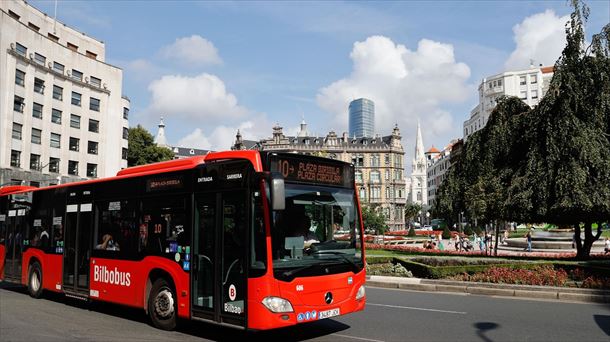In public transport, minimum services will be 30%. In hospitals, the usual staff will work on holidays, and on Saturdays in primary care. In Education, there will be two people for access control, and one teaching person for each educational stage.
The Basque Government, specifically the second vice-lehendakari and Minister of Labor and Employment, Idoia Mendia, established on March 8 the order referring to minimum services established for the strike called in the public sector of the Basque Autonomous Community (CAV) for this Tuesday, March 12. According to the provisions, the essential services will be the following:
Health
– In the hospitals, the usual staff will operate on a holiday in emergency services, cooking, food delivery, the cleaning strictly necessary for the operation of these services and the care due to hospitalized sick people. The predetermined and non-delayable dialysis and oncological treatments processes will also be maintained.
– In the primary carethe service corresponding to a Saturday must be provided, with the corresponding personnel.
– In the PAC (continuing care point) and emergency services, the service will be 100%.
– Lastly, in the call centerthe service will be 50% of the staff that usually provides these services.
Transport
– In buses, trains, trams, funiculars, and river transport, essential services equivalent to the 30%. This percentage will be distributed to prioritize those lines that lack alternative transportation services or that are destined for health centers. Likewise, entry and exit times to work centers must be especially covered. Services that, where applicable, begin prior to the start of the strike must continue to be carried out until their usual route is completed.
– The service will be maintained road maintenancewith the staff and service corresponding to a holiday.
Education
– Two people (one from the management team and another from staff in each shift) to guarantee the access control to the centers.
– In addition, a teacher person by each stage educational (Early Childhood Education, Primary Education, ESO, Baccalaureate and Vocational Training).
– Likewise, in Early Childhood Education and Primary Education, from 100 students enrolled in each stage, one more teaching person will be added in each corresponding stage. And after 200, another person will be added and so on for every 100.
– One Educational Support Specialist for each classroom.
– In Special Education Centers or in stable special education classrooms, 50% of the usual staff in the classrooms.
– The staff cleaning (Children and Special Education), 50%, will clean the floors, sinks, toilets and bathrooms and collect and remove organic waste.
– Regarding the staff of the kitchenthe dining room service will be guaranteed, through the preparation of easy and simple food in the centers themselves by at least 10% of the staff.
– At the UPV, 1 person for access control per shift and 1 teaching person to carry out the exams planned in the academic calendar that have a final evaluation rank. In Musikene and the Official Language Schools, 1 person for access control and in the second case, 1 teacher to take exams.
Social services
– In residencesthe fifty % of personnel who provide direct care, except during normal meal times, and from 8:00 a.m. to 10:30 a.m. and from 8:00 p.m. to 10:00 p.m., when this percentage will increase by 10%. This percentage will rise to 70%, in the case of residences where the profile of the users has, in more than 70%, levels of recognized dependency of grade II or III. On the night shift, service will be provided by 100% of the direct care staff. The health and kitchen staff will work at 50%, and 20% in cleaning. One person per shift in surveillance and access control tasks.
– In the day centers, community housing for the elderly and special education centers, as well as those that affect people with some degree of dependency or disability, direct care services will be maintained with 50% of the staff, except for meals, which will be increased by 10%. Likewise, 50% of the healthcare and kitchen staff is established as a minimum service. During the night shift the direct attention service will be 100%. Special transportation to the centers will be maintained in cases where it cannot be done by other means.
– In the sector of home help Food services, daily personal hygiene, and accompaniment work for health appointments that cannot be postponed will only be provided to those people with degrees of dependency II and III.
– In residences, educational centers and community homes for minors, as well as in Social Intervention Centers, the services corresponding to a holiday will be maintained.
Emergencies
– 100% of SOS-DEIAK services. The rest of these services (emergency attention and meteorology, firefighters, emergency stations and communications, road maintenance, including winter road service and emergencies in swamps, rivers and mountains, Civil Protection, Euskadi Traffic Management Center. ..) will remain with the staff equivalent to a holiday.
Justice
– The actions of the Guard Service, reception and registration of documents, distribution of urgent matters to the different judicial bodies, among others, will be guaranteed. – In the penitentiary centershealth care, food, communications and minimum visits and security of the inmates will be guaranteed with the usual staff on a Saturday.
– In the juvenile justice educational centers. At the Ibaiondo educational center in Zumarraga (Gipuzkoa), the minimum services will be those corresponding to a holiday Friday. In the rest, the template corresponding to a holiday will be maintained.
Electricity, gas and water. Holiday staff.
EITB. Daily information services will be guaranteed at their usual hours.
Citizen attention. Zuzenean offices, one person per location and shift. EJIE, holiday staff.
Source: Eitb
I’m Tifany Hawkins, a professional journalist with years of experience in news reporting. I currently work for a prominent news website and write articles for 24NewsReporters as an author. My primary focus is on economy-related stories, though I am also experienced in several other areas of journalism.

